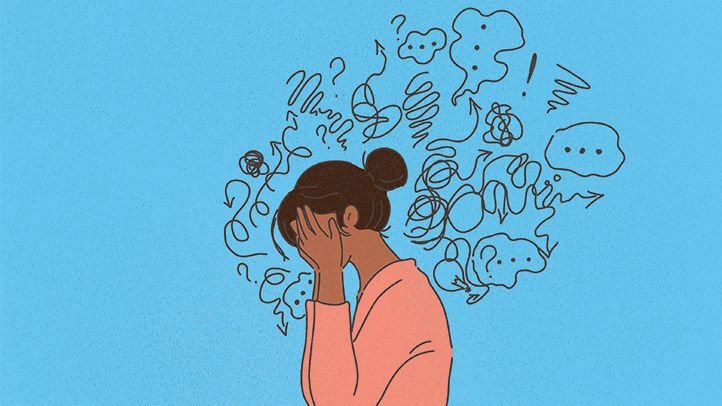
Depression
Depression is a mental or psychological disorder, in which there is a persistent feeling of sadness and loss of interest from everything that affects daily activities of life.
Depression is more common globally, approximately 264 billion people get affected by this. Women get more affected by depression as compared to men.
Depression for a long period of time with greater intensity can lead to suicide.
Causes :
â— Abnormal secretion of chemicals in the brain like serotonin, dopamine, or norepinephrine get out of balance and affect feelings of happiness.
â— Hormonal imbalance: during menopause or in a thyroid problem, the postpartum period estrogen level gets reduced in the body and that plays a major part in causing depression.
â— Environmental factors like violence or history of abuse, rape death of loved ones can cause depression.
â— Genetic factors play a very important role in this. The history of depression in family members like father, mother, sister, brother can affect people.
â— A person with low self-esteem and easily gets affected by stress or grief is prone to depression.
◠If a person is suffering from any type of cancer, diabetes, Parkinson’s, or any illnesses from a prolonged period of time can cause depression.
Types of depression :
Major depression: major depressive disorder. classic depression or unipolar depression is the other name of major depression.
In major depressive disorder, people usually suffer from depression every day and loss of interest in everything. They do not know what is happening in their surroundings. Symptoms :
â— Difficulty in sleep
â— The patient is gloomy.
â— Fatigue
â— Lack of interest in everything
â— Confusion
â— Anxiety
â— Continue thought of committing suicide.
Persistent depression: it is also known as chronic depression which lasts for more than 2 years. The intensity of symptoms in persistent depression is less than major depression but makes it difficult to interact with others or other day-to-day activities.
Manic or bipolar depression: in maniac or bipolar depression patients get a sudden attack of depression. Usually, a person is happy but suddenly happiness alternates with depression.
Manic depression lasts for seven days. Symptoms like:
â— Increased self-esteem
â— High energy
â— Reduced sleep
â— Irritable, etc. comes under manic depression.
Depressive psychosis: people suffering from depression may get psychosis conditions. In psychosis, a person can have visual or auditory hallucinations and illusions. People may hear voices or can have visions that are not real.
Postpartum depression: postpartum depression occurs after childbirth. It occurs due to hormonal changes in the body that can cause changes in mood. Estrogen does affect chemicals in the brain that maintain emotions and control them. Due to decreased estrogen, it can make changes in brain chemicals and can cause depression.
Premenstrual dysphoric disorder: it is a type of premenstrual syndrome that affects women before a week or on the day of menses starts.
Seasonal affective disorder: seasonal affective disorder starts in early winter and resolves itself in spring or summers.
Symptoms of depression :
◠A person suffering from depression doesn’t interact with people.
â— Lack of confidence.
â— Reduced appetite.
â— Confusion.
â— Anxiety.
â— Weeping tendency.
â— Lack of interest in everything. â— Sleeplessness.
â— Irritable.
â— hallucination.
â— Illusions.
â— Fatigue.
â— Tired.
Complications of depression :
â— Insomnia.
â— Sexual problems like erectile dysfunction or loss of libido.
â— Weight loss due to reduced appetite.
â— Depression from a prolonged period of time can lead to
suicide. Diagnosis :
â— Diagnosis is made by a detailed history of patients which includes symptoms, history of illness, history of treatment taken previously.
â— family history of patients if mother, father, brother, sister is suffering from depression to know it’s genetic.
â— A detailed history should be taken to find the cause of the disease.
â— Blood test to check: Anemia
Thyroid problem
Calcium or vitamin D deficiency.
â— EEG: to see the electrical activities of the brain.
◠Hamilton’s rating scale for depression: a multiple-choice
questionnaire has been made to rule out the severity of
depression. A questionnaire contains 21 questions that are related to depression.
Homeopathy treatment :
â— Aurum metallicum : aurum metallicum is indicated, where symptoms of depression started after the failure of business or work in their personal life. There is a great feeling of worthlessness with the tendency of suicidal thoughts. Symptoms get worse at night.
◠Ignatia Amara: Ignatia can be given to sensitive person have a tendency to suppress their emotions, like grief and disappointment. The patient does not want to be vulnerable and doesn’t show their weakness to others. Insomnia, headache are marked in this.
â— Staphysagria: Staphysagria is indicated for a person with suppressed feelings and emotions. The patient is an introvert and does not speak much. Depression is caused by shame, resentment. A person can experience insomnia and recurrent UTI.
